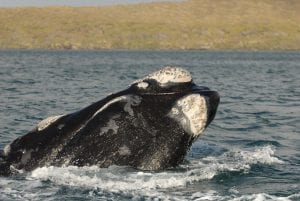The Southern Ocean Research Partnership
Is a collaboration of nations that promotes non-lethal whale research in the Southern Ocean. One of the initiative’s theme is: “The right sentinel for climate change: linking foraging ground variability to population recovery in the southern right whale”. Emma Carroll and Els Vermeulen are co-leads for the theme, which provides an over-arching research programme linking southern right whale population recovery from whaling and health with where and on what the whales feed.
Southern right whales: climate change sentinel
Recovery in southern right whales is linked to environmental conditions and krill abundance at high latitude areas thought to be important feeding grounds. This is probably because southern right whale mums need to eat a lot to get in good enough condition to have a baby. Mums will have one baby, on average, every three years, and she will loose about 25% of her body weight while nursing her baby in the first few months of its life. If mum doesn’t have enough food, she’s not fat enough to do this. However, while we know that southern right whales feed on copepods and krill, wee marine crustaceans, we don’t have a good idea about where the most important feeding grounds are, particularly around Aotearoa New Zealand and Australia.
We are leading a circumpolar collaboration, spanning all remaining major wintering areas, in order to understand where the whales are feeding and how this has changed compared with historical whaling data. To do this, we measure micro-chemicals called stable isotopes in the skin of southern right whales which is a reflection of where and what they feed on.
